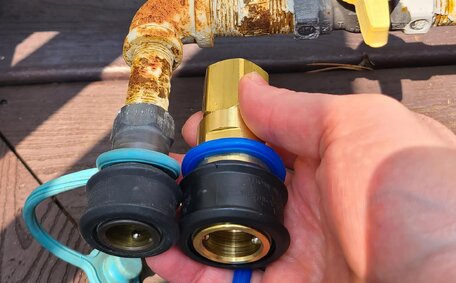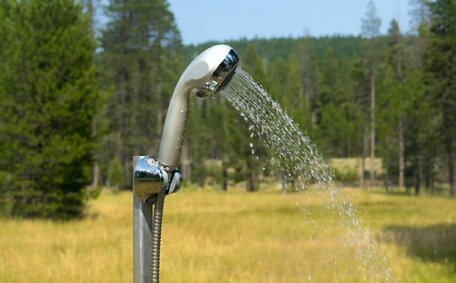Introduction to Gas Fittings and Potential Leaks
Gas fittings refer to the various joints, valves, and connections that make up a gas distribution system in a home or business. It is crucial to routinely check gas fittings for potential leaks, as undetected gas leaks can lead to dangerous situations. Additionally, gas leaks release harmful gases like carbon monoxide into the air, which is a colourless, odourless gas that can be fatal if inhaled.
For expert gas leak detection and resolution, including installation, repair, and maintenance, trust a professional service like Gladesville Plumbing in Sydney. We offer prompt diagnostics and repairs if you suspect a gas leak.
To help detect gas leaks, an odorant is added to natural gas and LP gas that produces a rotten egg smell.
Signs of a Gas Leak to Watch Out For
Odour
Trust your sense of smell—if it’s reminiscent of gas, don’t ignore it.
Stay alert for abnormal hissing noises, which may indicate gas escaping from an appliance or a pressure issue in the gas line, warranting immediate inspection.
Apply a soapy water solution to gas fittings as a preliminary leak test. If bubbles appear, shut off the gas valve right away and contact a professional.
For safety, turn off your gas if you suspect carbon monoxide presence, which is undetectable through colour or odour. Use a gas detector to recognise signs of gas or carbon monoxide leakage. A reliable detector is vital for safeguarding your home.
Trust your sense of smell—if it’s reminiscent of gas, don’t ignore it.
Odor
Keep in mind that natural gas is odourless; an additive with a rotten egg scent is used to signal a potential leak. If you detect this odour, it suggests a gas leak may have occurred.
Hissing or Whistling Noises
Pay attention to any out-of-place hissing sounds which may suggest that there?gnals a leak, as gas rapidly escapes through a breach. The pitch or volume of the hissing may fluctuate based on the size of the leak can often indicate its severity and the potential pressure gas situation. Small leaks can produce faint hisses, while larger leaks create louder whistling.
If you detect suspicious hissing from your gas system, call a professional immediately, as this sound often indicates a leaking point that requires urgent attention.
- In a spray bottle, mix together some liquid dish soap with water. Use roughly 1-2 tablespoons of soap per cup of water.
- Spray or brush the soapy solution directly onto areas you want to test like pipe connections, valves, appliance hoses, etc.
- Watch closely for any growing bubbles appearing on those areas. Bubbles indicate escaping gas.
- Should clear bubbles form at a fitting inside your home, it’s indicative of a leak necessitating prompt attention from a professional.
The soapy water solution works because the soap reduces surface tension, allowing bubbles to grow and become visible when gas escapes through a breach.
This is an easy DIY leak test anyone can perform.
Apply these liquid detectors similarly by spraying onto suspected leakage points and observing if bubbles emerge.
Use roughly 1-2 tablespoons of soap per cup of water.Spray or brush the soapy solution directly onto areas you want to test like pipe connections, valves, appliance hoses, etc.Watch closely for any growing bubbles appearing on those areas. Bubbles indicate escaping gas.Testing for Gas Leaks
Soapy Water Test
Performing the soapy water test by spraying a mixture onto gas connections and noting bubble formation is a reliable leak detection method.
Growing bubbles indicate escaping gas.
if you do smell gas, leak detector tools provide accurate results in locating the source of a natural gas leak. You can use gas leak detectors with sensors that instantly alert you to the presence of gas.
Performing the soapy water test by spraying a mixture onto gas connections and noting bubble formation is a reliable leak detection method.
Safety Precautions When a Leak is Suspected
If you suspect a gas leak in your home or business, follow these important safety precautions:
Ventilate the Area
To disperse gas, open all windows for adequate ventilation, especially as gas is heavier than air and canks and Flames
When a gas leak is suspected, avoid using matches, smoking, or operating electrical devices which could trigger ignition. Always exercise caution with gas appliances and eliminate any potential sources of sparks.
Turn Off the Gas
Find the main gas shut off valve, often by the gas meter, and carefully turn it to stop gas flow to your property. Remember not to operate electrical devices during this process.
Call a Professional
The first thing our licenced gas fitter does is to demonstrate how detect gas and coordinate with your gas supplier to pinpoint the source of the leaks and execute the required repairs.
Our team is ready round-the-clock for brisk emergency service in dealing with any potential leaks along your gas lines. In case of gas leak suspicion, evacuate the area immediately and contact emergency services or Gladesville Plumbing for prompt assistance.
Never attempt any gas work repairs in your home yourself, as this could worsen the problem. The complexities entailed in working gas systems, especially with active components, require expert handling and precision. Trust Gladesville Plumbing to address any leaks in your gas piping quickly and safely.
If you suspect a gas leak in your home or business, follow these important safety precautions:
Preventing Gas Leaks
Take proactive steps to prevent gas leaks and know about keeping your home safe; it’s vitally important to protect your family’s safety. Here are some tips to help avoid gas leaks from occurring:
Regular Maintenance
It’s a good idea to have every gas appliance, including your gas stove, in your home inspected and serviced to prevent any possible leak your lines might develop. Annual upkeep, ensuring every time it forms into habit, offive components, corrosion, or slack junctions.
Replace Old Appliances
Consider upgrading appliances like hot water heaters, cooktops, and ensure your new bbq gas connections are up to date for enhanced efficiency if they are over 10-15 years old. Older appliances are more prone to developing dangerous leaks in their gas connections and valves.
Fix Minor Leaks Promptly
If a minor leak is detected, such as in a gas cylinder, it’s crucial to arrange prompt repairs to prevent escalation. Don’t hesitate to contact a professional like Gladesville Plumbing for rapid, 24/7 emergency leak repairs.
Update Gas Lines
Update your gas pipes by replacing old galvanised steel or wrought iron with modern, corrosion-resistant materials to mitigate the risk of leaks.
Trust Gladesville Plumbing’s licenced gas technicians to install, maintain and repair your gas systems using quality materials and workmanship. Call us if you have any concerns about potential gas leaks or need annual servicing of your gas appliances.






